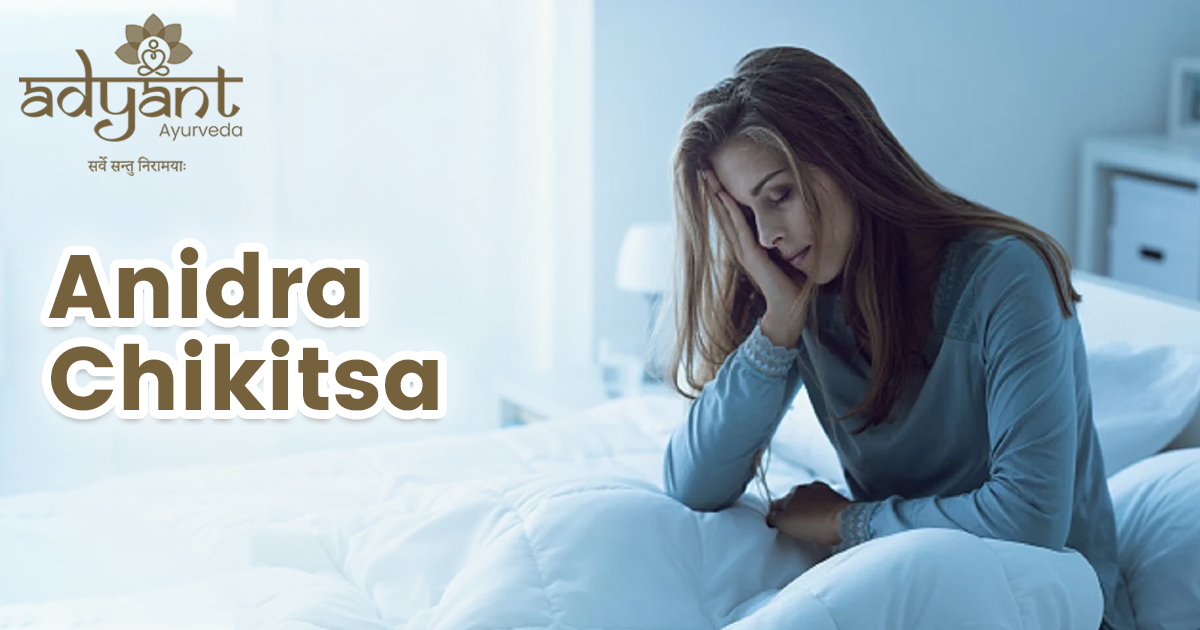Table of Contents
Toggle📋 Table of Contents
🌿 What is Insomnia in Ayurveda?
In Ayurveda, health is a balance of body (Sharira), mind (Manas), and spirit (Atma). Sleep (Nidra) is considered one of the three essential pillars of life (Trayopasthambha), along with Food (Ahara) and a Regulated lifestyle (Brahmacharya).
Insomnia (Anidra/Nidranasha) arises from Vata dosha imbalance, often aggravated by stress, overstimulation, poor lifestyle habits, or internal dysfunctions.
Unlike conventional tranquilizers, Ayurveda offers a natural cure by identifying and correcting the root causes through personalized detoxification, Rasayana, and routine correction.
Ayurveda also recognizes mental states such as anger (krodha), anxiety (chinta), and fear (bhaya) as key disruptors of Vata dosha leading to insomnia.
Additional Ayurvedic Insight:
Tarpaka Kapha (Kapha subtype in the brain) stabilizes sleep. Its deficiency disturbs sleep cycles.
Prajnaparadha (intellectual error) and imbalanced Rajas-Tamas gunas create psychological restlessness.
Ojas, the vital energy, when depleted, results in fatigue and poor sleep quality.
Causes are also classified as Nidra Upaghata Hetu: emotional disturbances, excessive fasting, overwork, seasonal imbalances, and more.
🤔 What Are the Types of Insomnia in Ayurveda and Modern Medicine?
Chronic Insomnia – Lasts for a month or more (Vata-Pitta imbalance)
Short-term Insomnia – 2–3 weeks (usually emotional)
Transient Insomnia – 1–7 days (usually environmental or situational)
Ayurvedic Symptom Classification:
Sleep onset insomnia – Vata dominance
Sleep maintenance issues – Vata-Pitta involvement
Early morning awakening – High Pitta imbalance
Also Read: A Complete Guide to Ayurvedic Doshas
💥 Common Causes of Insomnia
Disruption of circadian rhythm (biological clock) due to shift work, jet lag, or blue light exposure
Vitiated Vata and Pitta doshas
Emotional stress, grief, anxiety
Suppression of natural urges (urination, hunger, tears)
Irregular food and sleep patterns
Excessive intake of tea, coffee, alcohol, or drugs
Hormonal and chronic conditions (diabetes, menopause, GERD)
Neurological issues like PTSD, depression, and RLS
Note: About 50% of insomnia cases have no identified cause. Ayurvedic pulse diagnosis (Nadi Pariksha) and dosha-manasika guna analysis are essential.
⚕️ Ayurvedic Treatment for Insomnia and Sleep Disorders
▶ Shodhana Chikitsa (Detox Therapies)
Virechana (Purgation): Eliminates excess Pitta-Vata toxins
Basti (Medicated Enema): Balances Vata; rejuvenates the mind-body
Nasya: Brahmi Ghrita is administered via the nostrils to calm the nervous system
Dhanyamla Dhara: Fermented herbal liquid poured over the body for Vata-Kapha pacification
Takradhara / Ksheeradhara: Buttermilk/milk decoctions poured on the forehead to induce deep relaxation
▶ Shamana Chikitsa (Pacification Therapies)
Murdhataila: Shiro Abhyanga, Shirodhara, Shiropichu, Shirobasti—nourish the brain and soothe Vata
Shirodhara with Brahmi/Ksheerabala Taila: Balances serotonin and regulates melatonin rhythm
Ayurvedic Sleep Routine:
Padabhyanga (foot massage)
Moon gazing (Chandra Trataka)
Nutmeg milk or Brahmi tea
Soothing mantra listening before sleep
🌿 Best Ayurvedic Herbs and Medicines for Insomnia
| Herb | Properties | Dosha Action | Sleep Benefit |
|---|---|---|---|
| Brahmi | Calming, Medhya | Tridosha | Improves memory, reduces stress |
| Jatamansi | Sedative, mind-calming | Vata-Pitta | Induces deep, restful sleep |
| Ashwagandha | Adaptogen, Rasayana | Vata-Kapha | Lowers cortisol, improves focus |
| Shankhapushpi | Nervine tonic | Pitta-Vata | Alleviates anxiety, overthinking |
| Gotu Kola | Brain rejuvenator | Tridosha | Reverses nervous fatigue |
Top Classical Formulations:
Saraswatarishta
Manasmitra Vatakam
Kalyanaka Ghrita
Ashwagandha Vati
Tagara Capsules
Clinical Insight: A 35-year-old patient improved ISI score from 26 to 1 within 30 days using Panchakarma + Rasayana therapy.
Scientific Note: Shirodhara is proven to naturally elevate serotonin and melatonin, helping to realign the circadian rhythm.
🥗 What to Eat and Avoid for Better Sleep in Ayurveda
Diet Tips
Eat warm, light, freshly cooked meals
Include ghee, wheat, milk, curd, sugarcane juice, and ripe fruits
Have dinner before 8 PM
Avoid stimulants like coffee, cold drinks, fried/spicy food
Lifestyle Tips
Stick to a fixed sleep cycle (bed by 10 PM, wake by 6 AM)
Practice Abhyanga (self-massage) daily with Brahmi or sesame oil
Engage in Yoga Nidra, deep breathing, or candle gazing before sleep
Turn off screens an hour before bed
Use aromatherapy: lavender, sandalwood, or chamomile incense
Pro Tip: Identify your dominant dosha and customize a sleep-supportive Dinacharya (daily routine).Keep a simple Ayurvedic sleep diary to track your dinacharya (daily routine), food intake, emotions, and bedtime habits to spot patterns and improve Nidra quality.
🌿 Top 10 Ayurvedic Home Remedies for Insomnia
Nutmeg + Warm Milk – Calms Vata, improves sleep depth
Foot massage with Castor/Sesame Oil – Grounds Vata via Marma therapy
Brahmi Tea – Promotes clarity, reduces mental chatter
Lavender or Sandalwood Aromatherapy – Activates parasympathetic response
Turmeric + Milk + Ghee – Soothes inflammation and mind
Nutmeg + Ghee paste – Deepens rest for Pitta-Vata imbalance
Ashwagandha Root Powder – Adaptogenic; balances hormones and stress
Boiled Banana with Cardamom – Natural magnesium boost
Coriander-Cumin-Fennel Tea – Balances digestion & doshas
Chandra Trataka (Moon Gazing) – Enhances melatonin, calms the mind
- Ghee Nasya: Apply 2 drops of warm Anu Taila or cow ghee in each nostril before bed to calm Vata, enhance breathing, and promote restful sleep
❓ 15 Frequently Asked Questions (FAQs) About Ayurveda for Insomnia
What is the Ayurvedic name for insomnia?
In Ayurveda, insomnia is referred to as Anidra or Nidranasha, meaning lack or destruction of sleep.
Which dosha is responsible for insomnia?
Primarily, Vata dosha is responsible due to its mobile and light qualities, but Pitta may be involved in early waking or heated emotions.
Can Ayurveda help with sleep apnea?
Yes, Ayurveda addresses sleep apnea holistically by reducing Kapha obstruction, improving Agni (digestion), and supporting respiratory function.
Is there a Panchakarma treatment for insomnia?
Yes. Shirodhara, Basti, and Nasya are common Panchakarma therapies for detoxifying the nervous system and calming the mind.
How long does Ayurvedic treatment take to show results for sleep disorders?
Results vary, but typically noticeable improvement occurs in 2–4 weeks, with long-term change over 3 months of consistent therapy.
Can stress-related insomnia be treated with Ayurveda?
Absolutely. Herbs like Ashwagandha, Brahmi, and therapies like Shirodhara are highly effective in treating stress-induced insomnia.
Is there a seasonal pattern to insomnia in Ayurveda?
Yes, Vata season (autumn and early winter) can aggravate sleep disorders. Ayurveda recommends grounding practices and warm foods during this time.
What is the role of Ojas in sleep?
Ojas is the essence of all dhatus (tissues) and governs vitality, immunity, and sleep quality. Depleted Ojas leads to insomnia and mental fatigue.
Which mantras or chants does Ayurveda recommend for sleep?
Mantras like “Om,” “So Hum,” or “Shanti Mantra” calm the mind and balance Rajas guna, supporting sleep onset and depth.
Does Ayurveda recommend specific yoga for insomnia?
Yes. Gentle asanas like Balasana, Viparita Karani, Shavasana, and guided Yoga Nidra help calm the nervous system and promote sleep.
Can women with menopause-related insomnia benefit from Ayurveda?
Yes. Ayurveda addresses hormonal imbalances with herbs like Shatavari, Jatamansi, and therapies like Basti for restoring hormonal harmony.
Are Ayurvedic herbs safe to take long-term for sleep?
Yes, when prescribed by a qualified practitioner, herbs like Ashwagandha, Brahmi, and Jatamansi are safe and non-addictive.
What lifestyle habits disrupt sleep according to Ayurveda?
Late-night eating, excessive screen time, irregular routines, and excessive travel disturb Vata and suppress natural melatonin production.
Is caffeine bad for sleep in Ayurveda?
Yes. Caffeine aggravates Vata and Pitta, leading to hyperactivity, restlessness, and disturbed sleep. Ayurveda encourages herbal teas instead.
Can insomnia be linked to poor digestion in Ayurveda?
Yes. Improper digestion (low Agni) and toxin buildup (Ama) can cloud the mind and contribute to sleeplessness. Detox and digestive herbs are used to treat this.
🌱 Why Choose Ayurveda Over Sleeping Pills?
Modern sleep medications may offer short-term relief but often lead to dependency, fatigue, and poor mental clarity. Ayurveda, in contrast, offers:
Long-lasting results through dosha balancing
Non-addictive, herbal formulations like Ashwagandha and Brahmi
Detox procedures (e.g., Basti, Nasya) to calm the nervous system
Support for Ojas, Manovaha Srotas, and sattvic living
📊 Ayurveda vs. Allopathy for Insomnia
| Feature | Ayurveda | Allopathy |
|---|---|---|
| Approach | Root-cause, holistic | Symptom suppression |
| Remedies | Herbs, oils, Panchakarma | Sleeping pills, sedatives |
| Side Effects | None if guided properly | Dependency, grogginess |
| Goal | Balance Doshas, build Ojas | Quick sleep induction |
| Sustainability | Long-term & preventive | Short-term relief |
🏥 Ayurvedic Treatment for Insomnia in Bangalore
At Adyant Ayurveda’s branches across Jayanagar, Indiranagar, Rajarajeshwari Nagar, and Kalyan Nagar, our experienced doctors offer:
Personalized Nidra Chikitsa protocols
Shirodhara + Basti combo packages
Medhya Rasayana plans
Sleep-focused Panchakarma Detox Programs
📱 Download the “AyurCare” app or call 9972541009 to book your free consultation or appointment today.
🌿 Final Thoughts
Ayurveda doesn’t mask symptoms—it heals from within. With the right combination of diet, daily routine, herbal medicines, and therapies, you can restore your natural sleep cycle, reduce stress, and wake up refreshed.
Studies have shown that Ayurvedic therapies like Shirodhara, Ashwagandha supplementation, and Nasya not only improve sleep quality but also regulate cortisol and melatonin, key hormones involved in the sleep-wake cycle.
Reclaim your sleep—naturally, safely, and sustainably.






